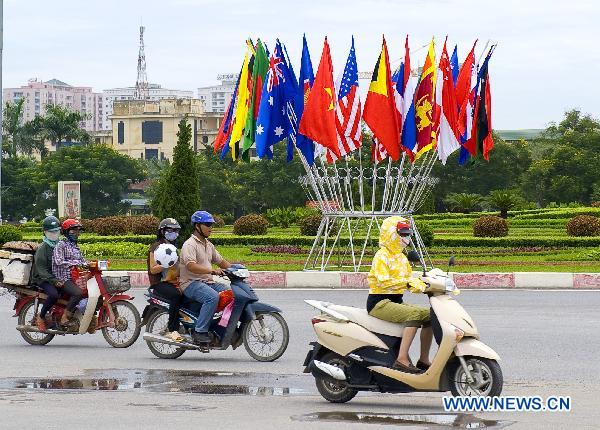DPRK Foreign Minister Departs for ASEAN Regional Forum

Vietnamese riding motorbikes pass by flags of countries and organizations participating the 43rd ASEAN Foreign Ministers' Meeting, in Hanoi, capital of Vietnam, July 19, 2010. (Xinhua/Chen Duo)
DPRK Foreign Minister Pak Ui Chun arrived in Beijing, making his way to Hanoi to attend ASEAN’s regional forum on Friday (23 July). KCNA announced Pak’s departure and his itinerary:
A DPRK delegation headed by Foreign Minister Pak Ui Chun left here Tuesday to attend the ARF to be held in Hanoi and the Special Ministerial Meeting for MDGs Review in Asia and the Pacific to be held in Jakarta and visit Vietnam, Laos, Myanmar and Indonesia.
Prior to Pak’s arrival and possibly in a preemptive move against discussion of the Cheonan, as well as any rhetorical capering (not to mention any potential restroom interactions) by the DPRK delegation, Xinhua reports on an ASEAN spokesperson invoking the Six-Party Talks (whose resumption is a dim prospect):
Ministers attending the 43rd ASEAN Foreign Ministers’ Meeting expressed the support for a nuclear-free Korean Peninsula and encouraged the parties concerned to resume the six-party talks as soon as possible, said the meeting’s spokesman Tran Ngoc An at a news briefing here. “The six-party talks will be a main solution for long-term peace in peninsula,” said An.
ASEAN foreign ministers also expressed their support for the declaration of United Nations Security Council (UNSC) earlier this month on the Cheonan warship sinking, which cost the lives of 46 South Korean sailors, said An.
ASEAN foreign ministers extended condolences to the people and government of the Republic of Korea for their loss, said the spokesman
The foreign ministers called for parties involved to remain restraint, increase confidence and resolve disputes and disagreements through peaceful methods, said the spokesman.
In reporting on Pak Ui Chun’s arrival in China, Kyodo pointed out that his trip to Myanmar (Burma) from 29 July to 1 August will be the first by a DPRK foreign minister since the 1983 Rangoon (Yangon) bombing. Irawaddy notes that weapons and tunnel contracts may not be the only exchange between the two countries:
It is interesting to note how soon the regime’s quest for ever more sophisticated weaponry took it in the direction of North Korea. According to Maung Aung Myoe, the Burmese generals began secret talks with the reclusive Communist regime to buy Hwasong (Scud-type) missiles as early as 2003. Although it remains unclear if the regime ever actually acquired these missiles, military analysts note that Burma has received a number of suspicious shipments from North Korean vessels over the past few years.
This North Korean connection appears to have done more than just provide the junta with another arms supplier. Increasingly, Naypyidaw seems to be considering Pyongyang’s brand of belligerent diplomacy as the basis for its foreign policy, possibly as a backup plan to ensure its survival if the upcoming election and transition to “disciplined democracy” fail to silence its Western critics.